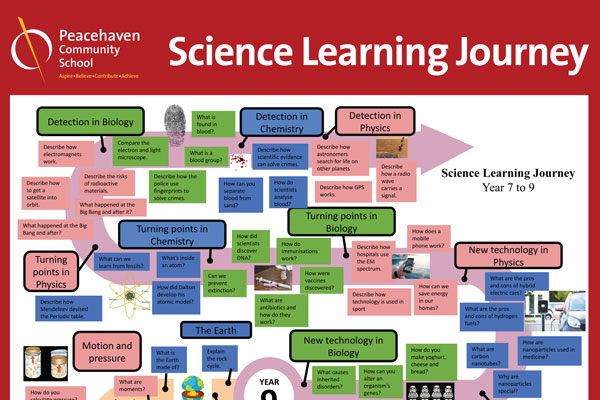
Science
Curriculum Intent
At Peacehaven Community School, our science curriculum is an integral part of our vision to provide an outstanding education that nurtures curiosity, ambition, and a deep appreciation for the natural world. Our commitment to inclusivity and resilience ensures that our students are equipped with the skills and knowledge to excel in their chosen scientific disciplines and positively influence the world around them.
Our students are inspired to believe in their abilities, as we immerse them in a stimulating learning environment filled with awe and wonder. Through the development of scientific thinking, our students cultivate a deep understanding of core scientific concepts, challenging misconceptions of various scientific principles. This fosters a comprehensive understanding of the interconnectedness of scientific phenomena within our students. We empower our students to be future leaders and innovators that can contribute to scientific advancements that will shape the future of our world.
Our Science curriculum drives our vision by promoting active contribution and preparing students for a diverse range of careers that positively impact society, from environmental science to biotechnology. Our hands-on approach to teaching develops practical skills, data analysis, and scientific communication, ultimately empowering our students to achieve excellence and contribute meaningfully to their community.
Lisa Murray - Head of Science - lisa.murray@swale.at
KS3
At KS3 in Science out students all follow the same pathway that is centred around the following core concepts of science; living organisms, ecosystems, matter, chemical reactions, forces and motion, energy, earth science & working scientifically.
Students have four lessons a week and regularly revisit each concept where they can recap their knowledge, address misconceptions and build upon their previous knowledge.
Year 7
In terms 1&2 students will be looking at;
-
The science lab & practical work
-
Cells and microscopes
-
Particles and states of matter
-
An introduction to forces.
In terms 3&4 students will be looking at;
-
The structure and function of body systems
-
Elements, atoms and compounds
-
Sound
-
Chemical Reactions
In terms 5&6 students will be looking at;
-
Reproduction
-
Light
-
Space
-
Acids & Alkalis
Medium Term Plans
Term 3
Particles
Forces
Term 4
Sound
Reactions
Year 8
In terms 1&2 students will be looking at;
-
Working scientifically (science practical skills)
-
Anatomy & Gas Exchange
-
Sound waves
-
Separation Techniques
In terms 3&4 students will be looking at;
-
Puberty and Menstruation
-
Light
-
Nutrition & Digestion
-
The Periodic Table
In terms 5&6 students will be looking at;
-
Photosynthesis
-
An overview of what they have learnt over the year
-
Exploring outdoor investigative skills
Medium Term Plans
Term 3
Energy
Seperating Techniques
Term 4
Metal & Acids
Adaptation
Year 9
In terms 1&2 students will be looking at;
-
Atoms
-
Forces & Motions
-
Electricity & Magnetism
-
Earth Sciences
In terms 3&4 students will ....
-
Genetics
-
Atoms
-
An introduction to biology, chemistry and physics at GCSE
In terms 5&6 students will …
-
B1. Cell Level Systems (GCSE)
-
C1. Particles (GCSE
Medium Term Plans
Term 4
Ecosystem Processes
Electricity and Magnetism
KS4
At KS4 we follow the OCR Gateway specification. Most students will do combined science and leave with two GCSEs, some students may do triple science and leave with three separate GCSEs. Those following combined science will have 5 lessons a week, and those doing triple will have 7 lessons a week.
Combined Specification; https://www.ocr.org.uk/Images/234596-specification-accredited-gcse-gateway-science-suite-combined-science-a-j250.pdf
Biology Specification (Triple science); https://www.ocr.org.uk/Images/234594-specification-accredited-gcse-gateway-science-suite-biology-a-j247.pdf
Chemistry Specification (Triple science);
Physics Specification (Triple Science);
Year 10
In terms 1&2 students will complete the following modules;
-
C2 Elements, Compounds & Mixtures
-
P1 Matter
-
P2 Forces
-
B2 Scaling Up
In terms 3&4 students will complete the following modules;
-
P3 Electricity and Magnetism
-
C3 Chemical Reactions
-
B3 Organism Level Systems
In terms 5&6 students will complete the following modules;
-
C4 Predicting & Identifying Reactions & Products
-
B4 Community Level Systems
-
P4 Waves and Radioactivity
Year 11
In terms 1&2 students will complete the following modules;
-
B5 Genes, Inheritance and Selection
-
C5 Reactions & Products
-
C6 Global Challenges
-
P5 Energy
In terms 3&4 students will complete the following modules;
-
P6 Global Challenges - 6 lessons
-
B6 Global challenges - 13 lessons
In term 5 students will be;
-
Reviewing and revising content from Year 10
-
Looking at recent assessments and reviewing any gaps in their knowledge
Additional Resources
Books we recommend for GCSE:
Combined Science
CPG Grade 9-1 Combined Science OCR Gateway Revision Guide Higher (grade 1-5) OR Foundation (grade 5-9)
Triple Science
CPG Grade 9-1 Biology OCR Gateway Revision Guide
CPG Grade 9-1 Chemistry OCR Gateway Revision Guide
CPG Grade 9-1 Physics OCR Gateway Revision Guide
Websites we recommend;
KS3
BBC Bitesize: https://www.bbc.co.uk/bitesize/subjects/zng4d2p
Oak Academy:
https://classroom.thenational.academy/
KS4
BBC Bitesize:
Combined - https://www.bbc.co.uk/bitesize/examspecs/z2dqqhv
Biology - https://www.bbc.co.uk/bitesize/examspecs/z3dj82p
Chemistry - https://www.bbc.co.uk/bitesize/examspecs/z92x7hv
Nothing in life is to be feared, it is only to be understood. Now is the time to understand more, so that we may fear less.
MARIE CURIE

